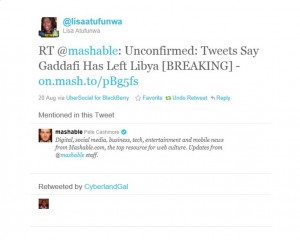 “RT @mashable: Unconfirmed: Tweets Say Gaddafi Has Left Libya [BREAKING] – http://t.co/zOpe3NO,” read a surprising tweet flashing across my smart phone screen Saturday afternoon.
“RT @mashable: Unconfirmed: Tweets Say Gaddafi Has Left Libya [BREAKING] – http://t.co/zOpe3NO,” read a surprising tweet flashing across my smart phone screen Saturday afternoon.
Since Mashable is a very reputable social media and technology blog, I immediately retweeted the message to my Twitter followers and began running searches to find out more about what was going on. Last January and February I’d followed the Revolution 2.0-powered uprisings in Tunisia and Egypt on Twitter and was excited about the possibility of sharing another historic moment electronically with people around the world.
Monitoring the Libyan rebels advance to Tripoli over the weekend, however, turned out to be much different. Fewer than 6 percent of Libyans are on the Internet (compared with 34 percent of people in Tunisia and 24 percent in Egypt) and DSL services have been largley blocked since the democratic uprising began in February.
Following unfolding events in a “digital black hole” was still riveting—but not the same. Here’s what following the tweets of the comparably few Libyans who had found a way to tweet eye-witness reports without Internet access was like for me:
- Virtually no photos and video. Unlike in Egypt and Tunisia, Libyans were uploading very few photos and videos, so you didn’t get the up-close feel. Only late Sunday, when Internet services were briefly and suddenly restored in Tripoli, did some eye-witness photos and videos seem to be getting out.
- Contradictory information. The steady stream of tweets and retweets emerging from Libyan sources painted a confusing, often contradictory picture of the evolving situation. Gaddafi had left the country, had suffered a heart attack, was flying to South Africa or Venezuela, and had been shot dead were among the many Twitter rumours that turned out to be wrong over the weekend. In comparison, at least in my own personal experience, the crowdsourced information coming out of Tunisia and Egypt on Twitter tended to be true.
- Little conversation. The Twitterverse seemed to be following the events in Libya without the commentary and esprit de corps you experienced last winter. Perhaps, Andy Carvin’s absence from Twitter Saturday because he was picking up a new dog for his family put a damper on things? Perhaps, people were afraid of passing on troop positions or bad information? Perhaps, people were afraid the Tripoli advance would end badly with hundreds of thousands of people killed and brutal Gaddafi still in power?
Since Libya is pretty much a “digital black hole,” you can’t really call the rebellion there a Twitter or social media revolution. Twitter and text messages, however, were certainly a factor. It will be fascinating to see how events in Libya unfold and read more analysis on technology’s impact them. Stay tuned.
Do you think the events in Libya are partially a social media or technology revolution? Please share your thoughts in the comments section below.